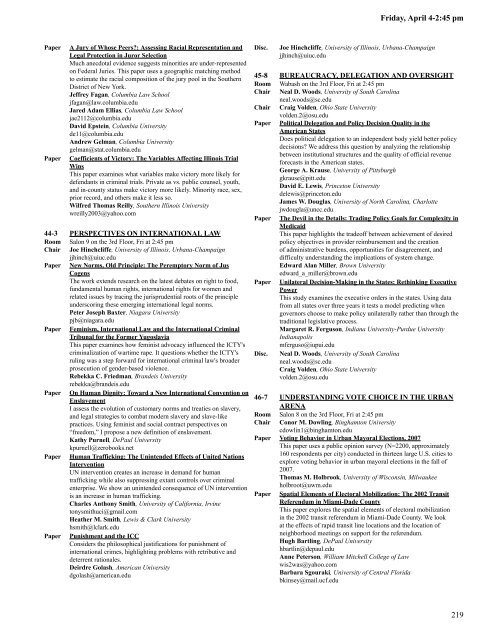2008 Conference Program - Midwest Political Science Association
2008 Conference Program - Midwest Political Science Association
2008 Conference Program - Midwest Political Science Association
Create successful ePaper yourself
Turn your PDF publications into a flip-book with our unique Google optimized e-Paper software.
Friday, April 4-2:45 pm<br />
Paper<br />
Paper<br />
A Jury of Whose Peers: Assessing Racial Representation and<br />
Legal Protection in Juror Selection<br />
Much anecdotal evidence suggests minorities are under-represented<br />
on Federal Juries. This paper uses a geographic matching method<br />
to estimate the racial composition of the jury pool in the Southern<br />
District of New York.<br />
Jeffrey Fagan, Columbia Law School<br />
jfagan@law.columbia.edu<br />
Jared Adam Ellias, Columbia Law School<br />
jae2112@columbia.edu<br />
David Epstein, Columbia University<br />
de11@columbia.edu<br />
Andrew Gelman, Columbia University<br />
gelman@stat.columbia.edu<br />
Coefficients of Victory: The Variables Affecting Illinois Trial<br />
Wins<br />
This paper examines what variables make victory more likely for<br />
defendants in criminal trials. Private as vs. public counsel, youth,<br />
and in-county status make victory more likely. Minority race, sex,<br />
prior record, and others make it less so.<br />
Wilfred Thomas Reilly, Southern Illinois University<br />
wreilly2003@yahoo.com<br />
44-3 PERSPECTIVES ON INTERNATIONAL LAW<br />
Room Salon 9 on the 3rd Floor, Fri at 2:45 pm<br />
Chair Joe Hinchcliffe, University of Illinois, Urbana-Champaign<br />
jjhinch@uiuc.edu<br />
Paper New Norms, Old Principle: The Peremptory Norm of Jus<br />
Cogens<br />
The work extends research on the latest debates on right to food,<br />
fundamental human rights, international rights for women and<br />
related issues by tracing the jurisprudential roots of the principle<br />
underscoring these emerging international legal norms.<br />
Peter Joseph Baxter, Niagara University<br />
pjb@niagara.edu<br />
Paper Feminism, International Law and the International Criminal<br />
Tribunal for the Former Yugoslavia<br />
This paper examines how feminist advocacy influenced the ICTY's<br />
criminalization of wartime rape. It questions whether the ICTY's<br />
ruling was a step forward for international criminal law's broader<br />
prosecution of gender-based violence.<br />
Rebekka C. Friedman, Brandeis University<br />
rebekka@brandeis.edu<br />
Paper On Human Dignity: Toward a New International Convention on<br />
Enslavement<br />
I assess the evolution of customary norms and treaties on slavery,<br />
and legal strategies to combat modern slavery and slave-like<br />
practices. Using feminist and social contract perspectives on<br />
“freedom,” I propose a new definition of enslavement.<br />
Kathy Purnell, DePaul University<br />
kpurnell@zerobooks.net<br />
Paper Human Trafficking: The Unintended Effects of United Nations<br />
Intervention<br />
UN intervention creates an increase in demand for human<br />
trafficking while also suppressing extant controls over criminal<br />
enterprise. We show an unintended consequence of UN intervention<br />
is an increase in human trafficking.<br />
Charles Anthony Smith, University of California, Irvine<br />
tonysmithuci@gmail.com<br />
Heather M. Smith, Lewis & Clark University<br />
hsmith@lclark.edu<br />
Paper Punishment and the ICC<br />
Considers the philosophical justifications for punishment of<br />
international crimes, highlighting problems with retributive and<br />
deterrent rationales.<br />
Deirdre Golash, American University<br />
dgolash@american.edu<br />
Disc.<br />
Joe Hinchcliffe, University of Illinois, Urbana-Champaign<br />
jjhinch@uiuc.edu<br />
45-8 BUREAUCRACY, DELEGATION AND OVERSIGHT<br />
Room Wabash on the 3rd Floor, Fri at 2:45 pm<br />
Chair Neal D. Woods, University of South Carolina<br />
neal.woods@sc.edu<br />
Chair Craig Volden, Ohio State University<br />
volden.2@osu.edu<br />
Paper <strong>Political</strong> Delegation and Policy Decision Quality in the<br />
American States<br />
Does political delegation to an independent body yield better policy<br />
decisions We address this question by analyzing the relationship<br />
between institutional structures and the quality of official revenue<br />
forecasts in the American states.<br />
George A. Krause, University of Pittsburgh<br />
gkrause@pitt.edu<br />
David E. Lewis, Princeton University<br />
delewis@princeton.edu<br />
James W. Douglas, University of North Carolina, Charlotte<br />
jwdougla@uncc.edu<br />
Paper The Devil in the Details: Trading Policy Goals for Complexity in<br />
Medicaid<br />
This paper highlights the tradeoff between achievement of desired<br />
policy objectives in provider reimbursement and the creation<br />
of administrative burdens, opportunities for disagreement, and<br />
difficulty understanding the implications of system change.<br />
Edward Alan Miller, Brown University<br />
edward_a_miller@brown.edu<br />
Paper Unilateral Decision-Making in the States: Rethinking Executive<br />
Power<br />
This study examines the executive orders in the states. Using data<br />
from all states over three years it tests a model predicting when<br />
governors choose to make policy unilaterally rather than through the<br />
traditional legislative process.<br />
Margaret R. Ferguson, Indiana University-Purdue University<br />
Indianapolis<br />
mferguso@iupui.edu<br />
Disc. Neal D. Woods, University of South Carolina<br />
neal.woods@sc.edu<br />
Craig Volden, Ohio State University<br />
volden.2@osu.edu<br />
46-7 UNDERSTANDING VOTE CHOICE IN THE URBAN<br />
ARENA<br />
Room Salon 8 on the 3rd Floor, Fri at 2:45 pm<br />
Chair Conor M. Dowling, Binghamton University<br />
cdowlin1@binghamton.edu<br />
Paper Voting Behavior in Urban Mayoral Elections, 2007<br />
This paper uses a public opinion survey (N=2200, approximately<br />
160 respondents per city) conducted in thirteen large U.S. cities to<br />
explore voting behavior in urban mayoral elections in the fall of<br />
2007.<br />
Thomas M. Holbrook, University of Wisconsin, Milwaukee<br />
holbroot@uwm.edu<br />
Paper<br />
Spatial Elements of Electoral Mobilization: The 2002 Transit<br />
Referendum in Miami-Dade County<br />
This paper explores the spatial elements of electoral mobilization<br />
in the 2002 transit referendum in Miami-Dade County. We look<br />
at the effects of rapid transit line locations and the location of<br />
neighborhood meetings on support for the referendum.<br />
Hugh Bartling, DePaul University<br />
hbartlin@depaul.edu<br />
Anne Peterson, William Mitchell College of Law<br />
wis2was@yahoo.com<br />
Barbara Sgouraki, University of Central Florida<br />
bkinsey@mail.ucf.edu<br />
219










